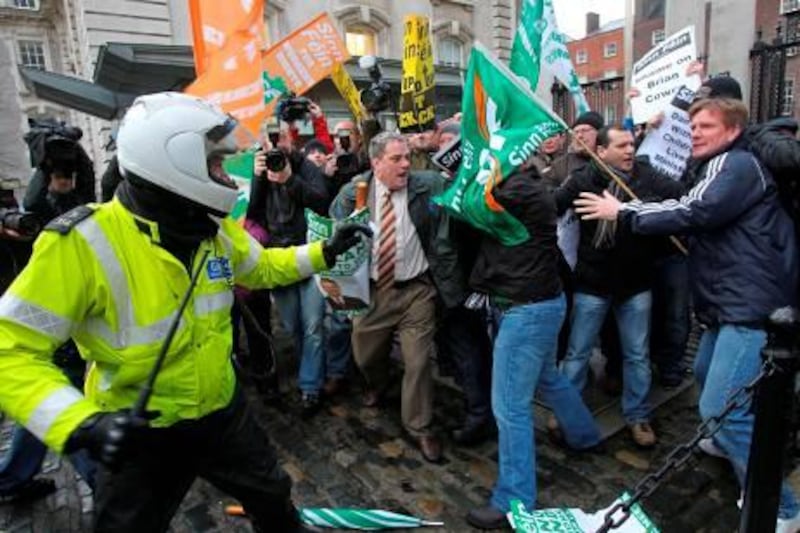DUBLIN // Ireland's beleaguered government is on the brink of collapse just two days after the country was forced to ask for a multi-billion euro rescue package from Europe and the International Monetary Fund.
In a shock move yesterday that plunged the country into political turmoil, the Green Party junior coalition partner said it would pull out of the government in the new year once crucial economic measures are taken to shore up the nation's ravaged economy and debt-laden banking sector.
The announcement came less than 24 hours after Ireland reluctantly said it was beginning formal negotiations on an EU/IMF rescue loan package worth an estimated €90bn (Dh449bn) that will lead to external oversight of the economy for at least three years.
Calling for an election in the second half of January, Green Party leader John Gormley said he wanted the government to have time to finalise a four-year austerity plan that will introduce €15bn in savings, pass an emergency 2011 budget next month and secure the EU/IMF bail-out.
"The past week has been a traumatic one for the Irish electorate. People feel misled and betrayed," Mr Gormley said.
"We have now reached a point where the Irish people need political certainty to take them beyond the coming two months."
The government announced on Sunday that it would seek an EU/IMF bailout after months of trying to survive its financial crisis with austerity measures and strict budgetary planning.
The move came after a week of pressure from European officials, who had hoped the aid package will help Ireland's sovereign debt crisis spreading to the rest of the Euro currency zone.
However, a short-lived relief rally on financial markets fizzled yesterday as investors weighed the new political uncertainty and the risk of pressure spreading to other vulnerable EU countries.
The EU/IMF package will see significant restructuring of Irish banks, whose reckless lending fuelled an unprecedented property bubble and construction boom that spectacularly imploded following the banking collapse in 2008. After seeing €23bn of deposits leave Ireland this year, the banks are to be reduced in size.
Crucially, Ireland will not be forced as part of the bailout to increase its low rate of corporation tax, despite concerns among some EU states that it is a form of unfair competition.
The EU's Economic Affairs Commissioner, Olli Rehn, said yesterday that the EU, European Central Bank and IMF were striving to wrap up the Irish rescue negotiations "by the end of the month".
The application for external aid dealt a humiliating blow to the prime minister, Brian Cowen, and his centre-right Fianna Fáil party, which has seen its popularity plunge to record lows over its role in the economic crisis; in one weekend poll only 17 per cent of voters said they would back the party in new elections.
Pressure mounted on Mr Cowen to resign yesterday, with backbenchers in his own party moving against him and two independent lawmakers who the government relies on for its slim parliamentary majority, warning that they may not vote for next month's crucial austerity budget.
Fianna Fáil also faces a by-election in the constituency of Donegal South West in Ireland's northwest on Thursday. The region has long been a stronghold of the party, which has been the dominant force in Irish politics since 1932. Failure to retain the seat amid public fury over the state of the economy would reduce the government's majority to two seats from three.
The adoption and implementation of a deficit-cutting budget is usually a condition for EU/IMF aid disbursements, which are subject to quarterly monitoring by the international watchdogs.
Eamon Gilmore, leader of the opposition Labour Party, said an election should be called as soon as possible, saying it wasn't desirable that negotiations with the EU and IMF were being conducted by a government "on its last legs".
Enda Kenny, leader of Fine Gael, the largest opposition party, also called for an immediate election, while the party's finance spokesman told Reuters the government would have difficulty surviving long enough to pass next month's budget.
If the centre-right Fine Gael party and the Labour party were to form the next ruling coalition, as is widely expected, it is unlikely that their austerity measures would differ significantly from current government's plans.
European shares and the euro reversed early gains yesterday amid fears that the Irish package would not prevent contagion reaching Portugal and possibly Spain.
Meanwhile, public reaction on the streets of the capital Dublin remained muted, with small numbers of protesters clashing briefly with police outside parliament buildings.






